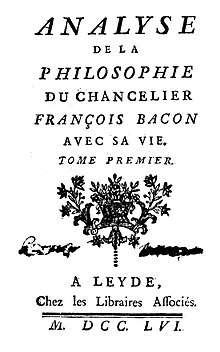Alexandre Deleyre
Alexandre Deleyre (10 January 1726, Portets near Bordeaux – 13 March 1796, Paris aged 71) was an 18th-century French man of letters.

Biography
Alexandre Deleyre was the son of the official servant Jean Deleyre. He studied at a Jesuit school in Bordeaux. From here, he moved to Paris, where after he became an atheist, he met Denis Diderot and Jean-Jacques Rousseau, philosophers of the French age of Enlightenment. Protected by the Duke of Nivernais, he was appointed librarian of Philip, Duke of Parma.[1]
He worked in 1754 for the Journal des Savants. From November 1756 to March 1757 he worked for the Journal étranger. This journal was published by Jean-Baptiste-Antoine Suard, François Arnaud (1721-1784), Antoine François Prévost and the lawyer Pierre-Jean-Baptiste Gerbier (1725-1788). He also wrote for the Journal encyclopédique by Pierre Rousseau (1716-1785).
During the French Revolution, he was sent to the National Convention as a member of Gironde, where he would address the issue of national education.
He voted for the execution of Louis XVI. On 31 May 1793, the uprising of the Parisian sans-culottes, resulted in the arrest and execution of leading Girondins. Ultimately, this first attempt of the Jacobins to overthrow Robespierre and Jean-Paul Marat using the Parisian sans-culottes to overthrow the Girondins failed. It put an end to the reign of terror that ultimately took place with the popular uprising of 2 June 1793 and the adoption of the Constitution of 24 June 1793. Its peak was reached in June and in July 1794, also called "Great Purge", la grande terreur. Deleyre was able to elude arrest after 31 May.
In addition to his works on philosophers, Deleyre contributed several articles, including Épingle and Fanatisme to the Encyclopédie by Diderot and d'Alembert. In his Dictionnaire philosophique, Voltaire would make use of his article on fanaticism.
Main works
- 1755: Analyse de la philosophie du chancelier François Bacon ;
- 1758: Le Génie de Montesquieu ;
- 1761: L'Esprit de Saint-Évremond ;
- 1761: Histoire générale des voyages, ou Nouvelle collection de toutes les relations de voyages par mer et par terre, qui ont été publiées:jusqu'à présent dans les différentes langues de toutes les nations connues ; (in collaboration with Antoine François Prévost, Étienne-Maurice Chompré and Jacques-Nicolas Bellin, 1746–1789).
- 1777: Eloge de M. Roux, docteur régent et professeur de chimie à la Faculté de Paris Amsterdam,
- 1792: Essai sur la vie et les ouvrages de Thomas
Bibliography
- Frank A. Kafker, Jeff Loveland: Antoine-Claude Briasson et l'Encyclopédie, Recherches sur Diderot et sur l'Encyclopédie, n° 35. (online)
- Frank A. Kafker: Les Ventes de l'Encyclopédie. In: Sciences, musiques, Lumières. Ferney, Centre international d'étude du XVIIIe siècle, 2002.
- Joachim Lebreton: Notice sur Deleyre (extraite des Mémoires de l'Académie des sciences morales). (1797) In: Friedrich Melchior Grimm: Correspondance littéraire.
- George Streckeisen-Moulton: J. J. Rousseau, ses amis et ses ennemis. (1863)
References
- Elisabeth Badinter: Der Infant von Parma: Oder die Ohnmacht der Erziehung. C.H. Beck, München 2010, ISBN 3-4066-0093-X, p. 11.
External links
- Alexandre Deleyre on Wikisource
- Alexandre Deleyre on Dictionnaire des journalistes
- Alexandre Deleyre on the site of the Assemblée nationale